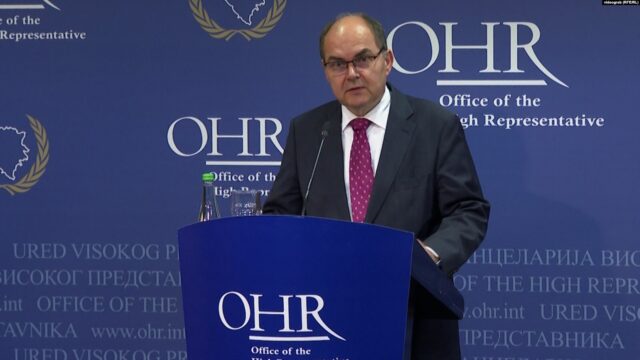SARAJEVO — Christian Schmidt, the international community’s high representative for Bosnia-Herzegovina, on July 1 annulled laws adopted by the Bosnian Serb entity’s National Assembly that his office had declared illegal, unacceptable, and detrimental to the Balkan nation’s unity.
Christian Schmidt also amended Bosnia’s Criminal Code to declare that any illegal actions that undermine the country’s constitutional order will be treated as criminal offenses.
Under the 1995 Dayton accords, Schmidt has the power to impose laws as the final interpreter of the state constitution, though his decisions can be reviewed and questioned by the Constitutional Court of Bosnia, if the Office of the High Representative (OHR) approves.
The Dayton accords, which ended the 1992-95 Bosnian War, established an administrative system under which the Bosnian state remains partitioned between Republika Srpska (RS) and the Muslim Bosniak-Croat Federation, connected by a weak central government.
Ethnic Serbs of Republika Srpska have for years resisted Bosnia’s central authorities, with the entity’s assembly voting on June 27 to suspend recognition of any decisions by Bosnia’s multi-ethnic Constitutional Court.
On June 1, the assembly adopted changes in the law that imply that decisions by the High Representative for Bosnia-Herzegovina would no longer be recognized.
The moves were seen as part of the secessionist efforts of certain Republika Srpska officials.
Some Serb leaders in Republika Srpska say they do not recognize Schmidt — a German diplomat who was appointed in 2021 as the high representative — because the UN Security Council did not endorse his nomination. China and Russia disputed his appointment because he was not confirmed by the Council, although other nations said it was not required.
Schmidt, in his decision, said that “entity assemblies do not have the authority to derogate from the provisions of Bosnia-Herzegovina, and they do not have the right to derogate from the jurisdiction of key Dayton institutions.”
Schmidt said he had ruled that the Republika Srpska assembly’s “law on the nonimplementation of decisions of the Constitutional Court of Bosnia-Herzegovina in the territory of RS will not come into force. “
Schmidt stressed that those who attempt to overthrow the constitutional order must be prosecuted.
“They will bear the consequences for their actions — all options are on the table,” he said.
The U.S. Embassy in Sarajevo said it “strongly welcomed” Schmidt’s decisions on the RS entity’s “unconstitutional,” “anti-Dayton laws.”
The British Embassy also said it backed Schmidt’s actions and expressed the joint support of the so-called Quint nations in Bosnia — the United States, Britain, Germany, France, and Italy.
The Serb member of the tripartite Bosnian presidency, Zeljka Cvijanovic, said that the RS would not recognize Schmidt’s latest rulings, claiming they “hinder the sovereign decision-making of institutions at all levels of government.”
The assembly’s June 27 vote on constitutional law was another in a series of steps orchestrated by Milorad Dodik, the president of the Republika Srpska entity — and the pro-Russia leader of the Serbs in Bosnia — and his Serb allies to reject the power-sharing structures established for Bosnia under the Dayton accords. (RFE/RL)
